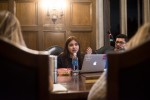Student organizations went on speed dates to build cross-community relationships.
About 15 students from various student organizations met in small groups at an event hosted by the Undergraduate Students Association Council General Representative 1 office Tuesday. Club representatives rotated around tables and engaged in conversations guided by a set of questions. Many of the clubs represented were cultural awareness and community service organizations.
Joshua Avila, chief of staff for programming for the General Representative 1 office and a second-year political science student, said the event aimed to create a space for clubs with common organizational missions to collaborate on their programming.
Avila said the General Representative 1 office wanted to provide a setting to make cross-organizational programs seem more feasible.
“We asked those types of questions to get people to have that conversation about: ‘Oh, you’re from that org? Well I’m from this org, too. We’ve always wanted to do something like that, too. Maybe we should coordinate,’” Avila said.
Avila added he thinks other club recruitment events, including the fall Enormous Activities Fair, were not conducive to individual and intimate discussion that could encourage inter-club collaboration.
“You’re not [usually] having a sit-down conversation with them. You’re talking with them because you’ve come with an agenda,” Avila said. “We really wanted to create a program that [would] bridge those genuine conversations with the ability to find another club you can join or find other types of things.”
Isabel Oraha, a third-year Middle Eastern studies and history student, said she attended the event on behalf of the Transfer Student Representative’s office. Oraha said the low turnout at the event was initially concerning but ultimately allowed for fruitful conversation.
“When I first got here I noticed that there wasn’t a whole lot of people, so I was a little worried about the event,” Oraha said. “But I think that having less people allowed me to connect more with the people who were here. I met a lot of people here [whose] club I had never [about] before or I knew about their org but I had never been able to actually get in contact with.”
Tina Yee, a first-year business economics student, said she noted a lack of professional organizations at the event and added she believes the limited turnout could be attributed to a lack of outreach.
“I’m not sure if the board members knew about this event,” Yee said. “It might have been an issue with emailing or maybe none of them [had] seen the event page.”
Avila added his office engaged with the event participants to identify ways student government can be more proactive in using resources to support club endeavors.
“The specific platform that we’re a part of is making sure that government resources and [the officers] can go to them and put their events and shows to life instead of them waiting on us and them going through our bureaucracy because student government is hard to transpire,” Avila said.
Avila said the office is considering holding similar events in the future, but is still not certain.
